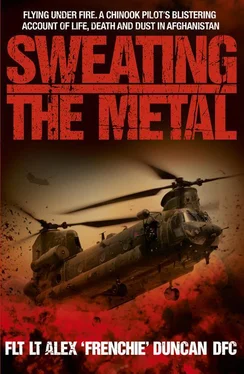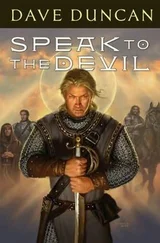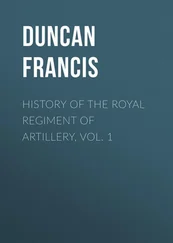Alex Duncan
SWEATING THE METAL
Flying Under Fire
A Chinook Pilot’s Blistering Account of Life, Death and Dust in Afghanistan
To my wife Alison, and my boys Guy and Max
Destiny chose me to fly the sky, since conception in the womb,
While nurtured by my mother’s breast, I had a duty to assume.
For I have flown past heaven’s door, to places you’ve not seen,
Constantly lived my boyhood dreams, in the places I have been.
I’ve flown the depths of darkness, by the light from stars alone,
I am utterly spellbound by that world, the world I call my own.
Taken from ‘The Fighter Pilot’ by Bazza
First and foremost, I’d like to express my deepest and most heartfelt thanks to my lovely wife Alison, my boys Guy and Max, and to my parents, for their unflinching love and support through some extremely testing times in my career as a military pilot.
Thanks are due to James at Watson, Little and to my publisher, Rupert Lancaster, for seeing the potential in this book from the very beginning. They both shared my belief that the work of the Chinook Force should be brought to a wider audience. Also to Kate Miles and all at Hodder and Stoughton who worked for so long to bring the book to life. I can’t thank you enough for your support, enthusiasm and sheer hard work. Thanks to Tara Gladden for polishing the manuscript – you really did a sterling job.
I’m indebted to the Ministry of Defence and its staff, in particular Squadron Leader Stuart Balfour, for allowing this story to be told and for supporting and facilitating Antony Loveless and those who worked to make it happen. Thanks Stuart, for shepherding the manuscript through to publication and for your advocacy in ensuring that what I wrote saw it through to the end.
Although the events that I describe in this book are as they appeared to me, they also represent the words and memories of countless others. To all of you, both named and anonymous, who gave up your time and your memories, thank you.
Huge thanks are due to all of my friends and colleagues in the Chinook Force at RAF Odiham, in particular the crewmen who work so tirelessly and give so much to make each sortie a success. I salute your commitment. The great unsung heroes of the Chinook Force are the technicians and engineers who keep us flying – thank you all. And a special thank you to JP, a brilliant leader, tactician and friend.
Special thanks to my friends and family who have backed and encouraged me throughout.
The final word must go to all those men and women of the British Armed Forces who fight so hard under such punishing and inhospitable conditions, while living in spartan, basic accommodation. Thank you all. You are a credit to yourselves, to your uniform and to the nation, and I feel proud to work alongside you. And to those who never made it back – you will never be forgotten.
MAY 17TH, 2008
I check my watch; we’ve been sitting ‘turning and burning’ – rotors spinning, burning fuel – on the pan at Camp Bastion, for fifty minutes now.
Early afternoon – Helmand Province in May – and the outside air temperature display on the instrument panel says it’s 50°C. The Chinook’s windscreen takes the full glare, turning the cockpit into a greenhouse where the ambient temperature is nudging 65°C. Hot doesn’t even come close; there’s no frame of reference for this.
A bead of sweat trickles from underneath my helmet and into my eye. I’ve had enough; I radio control…
‘Bastion Ops, Black Cat Two Two. Where’s the armourer?’ I ask.
‘Black Cat Two Two, Bastion Ops. Should be with you now.’
I twist and look over my left shoulder and see him walking up the ramp; I motion for him to sit on the jump seat. Bob Ruffles, my No.2 crewman, assists the armourer and plugs his helmet into the comms.
‘Okay, this is what we’ve got,’ I tell him. ‘We landed at Gereshk to refuel with our formation leader an hour ago, and his cab had a massive fuel leak. It’s completely soaked his Defensive Aids Suite, so his flares are now bathed in it. We’ll fly you to Gereshk so you can replace them. We’ll be back for you after our next sortie – about forty-five minutes.’
I look past him to the full load of passengers in the back. We’ve been briefed that they’re VIPs. They were supposed to be our wingman’s next load, but his cab isn’t going anywhere with fuel-soaked flares; it’s the armourer’s mission to replace those. Ours is to get the VIPs to Musa Qala.
I don’t know who they are except they’re very well dressed, so they look a bit out of place. Their questioning glares and furrowed brows tell me they’re an unhappy group of suits. I guess I’d be pissed off too if I’d waited in the heat for over an hour before boarding.
Time to get moving. Ordinarily, we’d be going nowhere without an Apache watching our backs, but we’ve been flying all morning and our escort – an Apache with the call sign Ugly Five Zero – is already at Musa Qala waiting for us.
‘Bastion Tower, Black Cat Two Two ready for departure.’
‘Black Cat Two Two, cleared for take-off and cross as required. Visibility 5km, wind two-five-zero at ten knots.’
‘Pre take-offs good, ready to lift,’ says Alex, my co-pilot, from the left seat.
‘Clear above and behind.’ This from Neil ‘Coops’ Cooper, my No.1 crewman at the ramp. Bob mans the port-side Minigun as we lift.
‘Take-off, Black Cat Two Two.’
I pull pitch and lift into the afternoon sky. It’s a short hop to Gereshk, just east of Camp Bastion, and we’re in the air no more than five minutes before I land us and drop off the armourer. Thirty seconds on the ground, no more. Coops gives the all clear and I lift us once again into the crystal-clear azure sky and turn due north for Musa Qala.
Ten more minutes and we’re about six miles from the target. I radio ahead to the Apache: ‘Ugly Five Zero, Black Cat Two Two. Inbound. Next location in five.’
‘Black Cat Two Two, Ugly Five Zero, visual. Be aware, enemy forces moving weapons along your route. Hold; we’re checking it out.’
This could indicate that something major is afoot. The Taliban often ditch their weapons, cache them and melt back into the civilian population. Once they do that, they know that our moral and ethical code prevents us from returning fire. The upside, though, is that if they want to launch an attack, they need to move the weapons into place. The Apache crew are using their reconnaissance pod to investigate.
We don’t have long to wait.
‘Black Cat Two Two, Ugly Five Zero. Enemy forces moving weapons to the south-west – suggest you try alternative routing. Guys, the ICOM chatter has got ten times worse. They’re up to something.’
If Taliban radio traffic has increased markedly, something is brewing. I feel the hairs on the back of my neck stand up.
I click the PTT button on the end of the cyclic to confirm I’ve received the message.
I decide to fly a feint into FOB Edinburgh. It’s a couple of miles away from Musa Qala but it’s on higher ground so if the Taliban are laying in wait for us, they’ll see us landing there and assume its our intended destination. I brief the crew. ‘I’ll just do a low-level orbit over Edinburgh and use terrain masking so they won’t see us at Musa Qala.’
Our biggest threat comes from rocket-propelled grenades (RPGs), but if we’re fast and low we’re that much harder to hit. Normally we fly an approach 50ft on the light and 45 on the noise; that means that if I go below 50ft, a warning light will come on and at 45ft a noise will sound. As the non-handling pilot, Alex has the noise and I have the light.
Читать дальше












